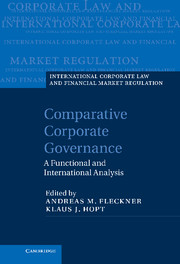Book contents
- Frontmatter
- Contents
- Contributors
- Preface
- Abbreviations
- Part I General report
- Part II National reports
- A Australia and Asia
- B Europe
- 6 Austria
- 7 Belgium
- 8 Denmark
- 9 Finland
- 10 France
- 11 Georgia
- 12 Germany
- 13 Hungary
- 14 Luxembourg
- 15 Netherlands
- 16 Norway
- 17 Poland
- 18 Portugal
- 19 Spain
- 20 Switzerland
- 21 United Kingdom
- C The Americas
- Part III Annex: Questionnaire
- Index
- References
18 - Portugal
Synopsis on corporate governance
from B - Europe
Published online by Cambridge University Press: 05 July 2013
- Frontmatter
- Contents
- Contributors
- Preface
- Abbreviations
- Part I General report
- Part II National reports
- A Australia and Asia
- B Europe
- 6 Austria
- 7 Belgium
- 8 Denmark
- 9 Finland
- 10 France
- 11 Georgia
- 12 Germany
- 13 Hungary
- 14 Luxembourg
- 15 Netherlands
- 16 Norway
- 17 Poland
- 18 Portugal
- 19 Spain
- 20 Switzerland
- 21 United Kingdom
- C The Americas
- Part III Annex: Questionnaire
- Index
- References
Summary
General information on corporate governance
Concept of corporate governance
Corporate governance is understood as the set of rules (legal, jurisprudential, deontological rules, articles of association), instruments, and questions concerning the management and control of companies.
Legal sources
The legal rules with respect to corporate governance in Portugal are principally found within the Code of Commercial Companies (Código das Sociedades Comerciais [“CSC”]), approved by Decree-Law 262/86, of September 2, 1986. The CSC contains legal rules that govern not only public limited liability companies, but also other types of company (general partnerships, private limited liability companies, limited partnerships). While the Code's structure and certain aspects of its regime are new, its genesis was highly influenced by EU law and German, Italian, and French laws. It has since been subject to various amendments. The most important of these, regarding corporate governance, was introduced by Decree-Law 76-A/2006, of March 29, 2006. Some influence of UK and US law is visible in this amendment.
Another important legal source in relation to corporate governance is the Code of Securities (Código dos Valores Mobiliários [“CVM”]), approved by Decree-Law 486/99, of November 13, 1999. It has been subject to some amendments, in particular those introduced by Decree-Law 357-A/2007, of October 31, 2007. The Code regulates securities, shares and public takeover bids (including mandatory public takeover bids), other financial instruments, forms of organic negotiation of financial instruments, and the supervisory powers given to the Commission on the Securities Market (Comissão do Mercado de Valores Mobiliários [“CMVM”]), the public authority responsible for the capital market; the CVM also contains a special regime concerning so-called “open companies” (namely, listed companies).
- Type
- Chapter
- Information
- Comparative Corporate GovernanceA Functional and International Analysis, pp. 788 - 821Publisher: Cambridge University PressPrint publication year: 2013

